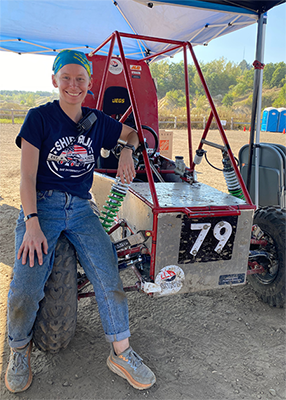Highlights
ABET-accredited
Only school in Pennsylvania's State System with 6 ABET accredited programs
What to Expect
Courses in statics, dynamics, fluid mechanics, thermodynamics, and machine design
Hands-on Experience
Labs emphasize CAD/CAM, process control, and prototyping

Mechanical Engineering is one of the most in-demand career paths. Ship’s ABET-accredited program equips students with skills in system design, thermodynamics, robotics, and manufacturing. Students gain hands-on experience using top-notch design tools like CAD/CAM, rapid prototyping, and process simulation.
Students graduate with the ability to design and analyze mechanical systems in disciplines such as automotive, aerospace, manufacturing, and energy.
Mette Madsen sets an example for women in mechanical engineering

Mechanical engineering student, Mette Madsen, is the only female member of the Shippensburg University SAE BAJA team. As the only woman on the team, she took on the role of being in charge of the roll cage and suspension for the team’s buggy models – used to compete in competitions across the nation. Madsen strives to inspire women to explore the field of engineering and to take on the challenge of entering male-dominated spaces.
“My interest or inspiration to pursue mechanical engineering started in my childhood,” Madsen said. “My father is an electronics engineer, and since the age of seven, I would spend my free time helping him with projects around the house from fixing light fixtures, building a fence, doing automotive maintenance and small electronic things too. I’ve always loved working with my hands, putting things together, and learning the mechanics behind it.”
Madsen’s studies as a mechanical engineering student and passion for the field led her to join Ship’s SAE BAJA team, where students design and build an off-road buggy designed to operate through rough landscapes.
SAE BAJA Club
SAE BAJA consists of competitions organized by the Society of Automotive Engineers that simulate real-world engineering design projects and their related challenges. Engineering students are tasked to design and build an off-road vehicle that will survive the severe punishment of rough terrain. Each team's goal is to design and build a single-seat, all-terrain, sporting vehicle whose structure contains the driver. The vehicle is to be a prototype for a reliable, maintainable, ergonomic, and economic production vehicle which serves a recreational user market. Competitions are held across the world, including three that comprise the North American series. Click here for more information about the Ship BAJA Club.
Course work for Mechanical Engineering, BS
The program requires 124 credits including the university's general education curriculum. For full course descriptions, please visit the undergraduate catalog.
Accreditation Information
The Mechanical Engineering degree program is accredited by the Engineering Accreditation Commission of ABET, https://www.abet.org, placing Shippensburg University among 46 Pennsylvania colleges and universities that have ABET-accredited programs. For more information on ABET, visit ABET Information.
ABET accreditation means that the national accrediting organization has spent time on our campus making sure that our curriculum meets national standards, our faculty are well-supported and current in the discipline, and our infrastructure is up-to-date and well-supported. It is your assurance that, not only is our program strong today, but we have also laid the foundation so that it will continue to be strong in the future.

